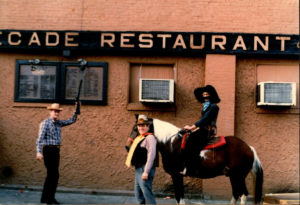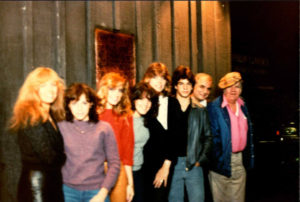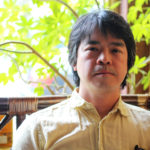A Rebel With a Cause

Photo by Lauren Zawatski
words: Lauren Zawatski
photos: Lauren Zawatski & Dominic DiSilvio
Though he has a little less full, curly hair on his head than he did in the 1970s heyday of Oakland’s Decade night club, and a slightly slower gait, Dominic DiSilvio’s audacious spirit is still intact.
The 77-year-old Italian was the owner of the renowned Oakland night club “The Decade” for over 20 years until its closing in 1995. Recently, he and his granddaughter Gabby Means released a book, “The Decade: Images of Modern America,” highlighting the far-reaching impact of DiSilvio and his club.
Even as he approaches his eighth decade, DiSilvio is just as lively as he was at The Decade through the 1970s and ’80s. During his tenure at the club, musicians like Bruce Springsteen, U2, The Ramones, Cyndi Lauper and The Iron City Houserockers loudly rocked their way through the building’s frequently packed space.
Pittsburgh Post Gazette writer and reviewer Scott Mervis recalls in a recent article that at The Decade, “the energy of the music, the hard-nosed staff, cramped spaces, cluttered decor, lack of a bathroom door (!) and the uneasy convergence of students, punks and blue-collar locals made it a place where anything could happen.” The club’s animated, tight-knit community was a staple in Oakland’s history, and its atmosphere was one that reflected DiSilvio himself.
“I knew from an early age he wasn’t like every dad,” DiSilvio’s eldest daughter Gina Means says. “I remember him wearing big platform shoes, bell bottoms … None of my friends’ parents were like that.”

Photo courtesy of Dominic DiSilvio
This uniqueness is also mirrored in one of his passions: bars. When DiSilvio was 15, he and his family would vacation in Ocean City, New Jersey. Unfortunately for him, the town was dry. To solve his problem, he would simply go over a small bridge that connected Ocean City with the lively Somers Point, New Jersey, and sneak into the town’s wild bars. While there, he’d hear artists like Bill Halley and Conway Twitty, and another passion, music, was satisfied.
Years later, DiSilvio’s love for music and bars merged, and The Decade was born. Owning a nightclub only emphasized what his family calls his “mercurial” nature. The Decade was DiSilvio’s home, and though he welcomed people of all walks of life through the club’s doors, he was fiercely protective of it as well.
One night in 1978, before The Decade hosted the Iron City Houserockers, members of their record company came to visit. While looking for the Houserockers’ lead singer Joe Grushecky, DiSilvio walked into the dressing room (the kitchen, at the time), and before his eyes stood a towering, disheveled rocker known as Meat Loaf. Wary of the man, DiSilvio asked what was going on. Grushecky replied, “This is Meat Loaf!” Unfazed, DiSilvio said, “I don’t give a shit if he’s fettucine alfredo; get him out of my kitchen.”
This tenacity pushed DiSilvio headfirst through the various problems he faced during his time as The Decade’s owner.
One such difficulty came as snow nearly two feet tall covered the ground one January evening at the club. DiSilvio had a large band in from out of town scheduled to play that night, but the group was more concerned about making it to their next show than playing one at The Decade. They came to DiSilvio, expecting not to get paid, and asked just for gas money to get to Cleveland. Instead, DiSilvio answered, “No, I’m not givin’ you gas money … I’m gonna pay you, and you’re gonna play!” The band did play that night — three full sets — to the small audience that was mostly comprised of DiSilvio’s family.

Photo via Dominic DiSilvio
The other end of DiSilvio’s fluctuating scale holds his gentle and caring side. When the Houserockers’ soundman, “Big Bob” Boyer, was found dead in a local motel, DiSilvio stepped forward and took charge. The man didn’t have any family members, so DiSilvio paid the cremation and funeral expenses. Since he knew how much The Decade meant to Boyer, and how much Boyer meant to local musicians, DiSilvio paid tribute to the man by having a casket made and burying his ashes under The Decade’s own stage.
A great contributor to DiSilvio’s mellower side is his family — his third, and perhaps most important passion. His daughter Gina Means remembers times in her father’s younger days when he would “walk and talk.”
“We always had to get an extra-long cord from the phone company,” she says. “He’d walk from one end of the house to another talking on the phone.”
Throughout her college years, she had memories like that with her dad when just the two of them would “walk and talk” together around Pitt’s campus.
“He’d say, ‘Let’s take a walk,’ and you’d think ‘Oh my gosh, what’s he gonna talk about?’ I look back now and think, ‘Wow, he really cared,’” Gina says.
This part of DiSilvio is apparent to granddaughter Gabby as well. They spent two summers together writing the book that chronicles The Decade’s history, and Gabby recalls her grandfather’s support of her other writing endeavors as well.

Photo via Dominic DiSilvio
During her freshman year of college, she talked with her grandfather and explained how she wanted to go after a career in writing, while also thinking about her slim prospects of success.
“We were sitting down and talking and he said, ‘Gabby, I think it’s always good to do what you love,’” she says.
DiSilvio’s love and support of his family and their mutual love and respect in return has only fueled The Decade’s success. Without his family, he realized The Decade wouldn’t have been able to operate.
“My family, we are The Decade,” he says. “I couldn’t have done any of this without them.”
Though The Decade’s fire has since burned out, DiSilvio remembers fondly the special aura the place held.
“There have a lot of places that tried to copy us … and failed,” he says. “It was one helluva ride.”
 Previous Post
Previous Post